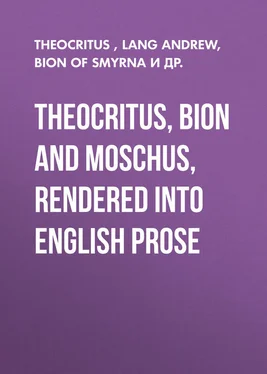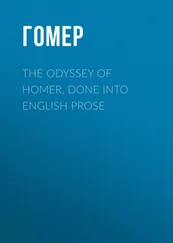Array Moschus - Theocritus, Bion and Moschus, Rendered into English Prose
Здесь есть возможность читать онлайн «Array Moschus - Theocritus, Bion and Moschus, Rendered into English Prose» — ознакомительный отрывок электронной книги совершенно бесплатно, а после прочтения отрывка купить полную версию. В некоторых случаях можно слушать аудио, скачать через торрент в формате fb2 и присутствует краткое содержание. Жанр: foreign_antique, foreign_prose, на английском языке. Описание произведения, (предисловие) а так же отзывы посетителей доступны на портале библиотеки ЛибКат.
- Название:Theocritus, Bion and Moschus, Rendered into English Prose
- Автор:
- Жанр:
- Год:неизвестен
- ISBN:нет данных
- Рейтинг книги:5 / 5. Голосов: 1
-
Избранное:Добавить в избранное
- Отзывы:
-
Ваша оценка:
- 100
- 1
- 2
- 3
- 4
- 5
Theocritus, Bion and Moschus, Rendered into English Prose: краткое содержание, описание и аннотация
Предлагаем к чтению аннотацию, описание, краткое содержание или предисловие (зависит от того, что написал сам автор книги «Theocritus, Bion and Moschus, Rendered into English Prose»). Если вы не нашли необходимую информацию о книге — напишите в комментариях, мы постараемся отыскать её.
Theocritus, Bion and Moschus, Rendered into English Prose — читать онлайн ознакомительный отрывок
Ниже представлен текст книги, разбитый по страницам. Система сохранения места последней прочитанной страницы, позволяет с удобством читать онлайн бесплатно книгу «Theocritus, Bion and Moschus, Rendered into English Prose», без необходимости каждый раз заново искать на чём Вы остановились. Поставьте закладку, и сможете в любой момент перейти на страницу, на которой закончили чтение.
Интервал:
Закладка:
Begin , ye Muses dear , begin the pastoral song !
For him the jackals, for him the wolves did cry; for him did even the lion out of the forest lament. Kine and bulls by his feet right many, and heifers plenty, with the young calves bewailed him.
Begin , ye Muses dear , begin the pastoral song !
Came Hermes first from the hill, and said, ‘Daphnis, who is it that torments thee; child, whom dost thou love with so great desire?’ The neatherds came, and the shepherds; the goatherds came: all they asked what ailed him. Came also Priapus, —
Begin , ye Muses dear , begin the pastoral song !
And said: ‘Unhappy Daphnis, wherefore dost thou languish, while for thee the maiden by all the fountains, through all the glades is fleeting, in search of thee? Ah! thou art too laggard a lover, and thou nothing availest! A neatherd wert thou named, and now thou art like the goatherd:
Begin , ye Muses dear , begin the pastoral song !
‘For the goatherd, when he marks the young goats at their pastime, looks on with yearning eyes, and fain would be even as they; and thou, when thou beholdest the laughter of maidens, dost gaze with yearning eyes, for that thou dost not join their dances.’
Begin , ye Muses dear , begin the pastoral song !
Yet these the herdsman answered not again, but he bare his bitter love to the end, yea, to the fated end he bare it.
Begin , ye Muses dear , begin the pastoral song !
Ay, but she too came, the sweetly smiling Cypris, craftily smiling she came, yet keeping her heavy anger; and she spake, saying: ‘Daphnis, methinks thou didst boast that thou wouldst throw Love a fall, nay, is it not thyself that hast been thrown by grievous Love?’
Begin ye Muses dear , begin the pastoral song !
But to her Daphnis answered again: ‘Implacable Cypris, Cypris terrible, Cypris of mortals detested, already dost thou deem that my latest sun has set; nay, Daphnis even in Hades shall prove great sorrow to Love.
Begin , ye Muses dear , begin the pastoral song !
‘Where it is told how the herdsman with Cypris – Get thee to Ida, get thee to Anchises! There are oak trees – here only galingale blows, here sweetly hum the bees about the hives!
Begin , ye Muses dear , begin the pastoral song !
‘Thine Adonis, too, is in his bloom, for he herds the sheep and slays the hares, and he chases all the wild beasts. Nay, go and confront Diomedes again, and say, “The herdsman Daphnis I conquered, do thou join battle with me.”
Begin , ye Muses dear , begin the pastoral song !
‘Ye wolves, ye jackals, and ye bears in the mountain caves, farewell! The herdsman Daphnis ye never shall see again, no more in the dells, no more in the groves, no more in the woodlands. Farewell Arethusa, ye rivers, good-night, that pour down Thymbris your beautiful waters.
Begin , ye Muses dear , begin the pastoral song !
‘That Daphnis am I who here do herd the kine, Daphnis who water here the bulls and calves.
‘O Pan, Pan! whether thou art on the high hills of Lycaeus, or rangest mighty Maenalus, haste hither to the Sicilian isle! Leave the tomb of Helice, leave that high cairn of the son of Lycaon, which seems wondrous fair, even in the eyes of the blessed. 11 11 These are places famous in the oldest legends of Arcadia.
Give o’er , ye Muses , come , give o’er the pastoral song !
‘Come hither, my prince, and take this fair pipe, honey-breathed with wax-stopped joints; and well it fits thy lip: for verily I, even I, by Love am now haled to Hades.
Give o’er , ye Muses , come , give o’er the pastoral song !
‘Now violets bear, ye brambles, ye thorns bear violets; and let fair narcissus bloom on the boughs of juniper! Let all things with all be confounded, – from pines let men gather pears, for Daphnis is dying! Let the stag drag down the hounds, let owls from the hills contend in song with the nightingales.’
Give o’er , ye Muses , come , give o’er the pastoral song !
So Daphnis spake, and ended; but fain would Aphrodite have given him back to life. Nay, spun was all the thread that the Fates assigned, and Daphnis went down the stream. The whirling wave closed over the man the Muses loved, the man not hated of the nymphs.
Give o’er , ye Muses , come , give o’er the pastoral song !
And thou, give me the bowl, and the she-goat, that I may milk her and poor forth a libation to the Muses. Farewell, oh, farewells manifold, ye Muses, and I, some future day, will sing you yet a sweeter song.
The Goatherd . Filled may thy fair mouth be with honey, Thyrsis, and filled with the honeycomb; and the sweet dried fig mayst thou eat of Aegilus, for thou vanquishest the cicala in song! Lo here is thy cup, see, my friend, of how pleasant a savour! Thou wilt think it has been dipped in the well-spring of the Hours. Hither, hither, Cissaetha: do thou milk her, Thyrsis. And you young she-goats, wanton not so wildly lest you bring up the he-goat against you.
IDYL II
Simaetha , madly in love with Delphis , who has forsaken her , endeavours to subdue him to her by magic , and by invoking the Moon , in her character of Hecate , and of Selene . She tells the tale of the growth of her passion , and vows vengeance if her magic arts are unsuccessful .
The scene is probably some garden beneath the moonlit shy , near the town , and within sound of the sea . The characters are Simaetha , and Thestylis , her handmaid .
Where are my laurel leaves? come, bring them, Thestylis; and where are the love-charms? Wreath the bowl with bright-red wool, that I may knit the witch-knots against my grievous lover, 12 12 Reading, καταδήσομαι. Cf. Fritzsche’s note and Harpocration, s.v.
who for twelve days, oh cruel, has never come hither, nor knows whether I am alive or dead, nor has once knocked at my door, unkind that he is! Hath Love flown off with his light desires by some other path – Love and Aphrodite? To-morrow I will go to the wrestling school of Timagetus, to see my love and to reproach him with all the wrong he is doing me. But now I will bewitch him with my enchantments! Do thou, Selene, shine clear and fair, for softly, Goddess, to thee will I sing, and to Hecate of hell. The very whelps shiver before her as she fares through black blood and across the barrows of the dead.
Hail, awful Hecate! to the end be thou of our company, and make this medicine of mine no weaker than the spells of Circe, or of Medea, or of Perimede of the golden hair.
My magic wheel , draw home to me the man I love !
Lo, how the barley grain first smoulders in the fire, – nay, toss on the barley, Thestylis! Miserable maid, where are thy wits wandering? Even to thee, wretched that I am, have I become a laughing-stock, even to thee? Scatter the grain, and cry thus the while, ‘’Tis the bones of Delphis I am scattering!’
My magic wheel , draw home to me the man I love !
Delphis troubled me, and I against Delphis am burning this laurel; and even as it crackles loudly when it has caught the flame, and suddenly is burned up, and we see not even the dust thereof, lo, even thus may the flesh of Delphis waste in the burning!
Читать дальшеИнтервал:
Закладка:
Похожие книги на «Theocritus, Bion and Moschus, Rendered into English Prose»
Представляем Вашему вниманию похожие книги на «Theocritus, Bion and Moschus, Rendered into English Prose» списком для выбора. Мы отобрали схожую по названию и смыслу литературу в надежде предоставить читателям больше вариантов отыскать новые, интересные, ещё непрочитанные произведения.
Обсуждение, отзывы о книге «Theocritus, Bion and Moschus, Rendered into English Prose» и просто собственные мнения читателей. Оставьте ваши комментарии, напишите, что Вы думаете о произведении, его смысле или главных героях. Укажите что конкретно понравилось, а что нет, и почему Вы так считаете.












